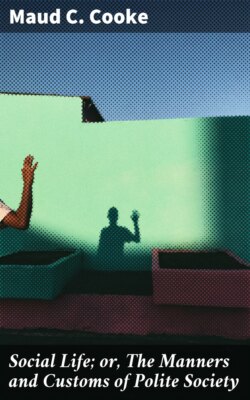Читать книгу Social Life; or, The Manners and Customs of Polite Society - Maud C. Cooke - Страница 19
На сайте Литреса книга снята с продажи.
What Should Follow the Introduction.
ОглавлениеTable of Contents
Nowadays, the usual recognition of an introduction is by a formal bow. Handshaking rarely occurs and a gentleman introduced to a lady never offers his hand unless she should first extend her own. The inclination on the part of the lady is slight, that of the gentleman deeper. The custom of a courtesy by the lady has scarcely taken root in this country.
A hostess receiving in her own parlors is at liberty, if she should wish, to extend her hand to all comers.
A gentleman upon being introduced to a lady usually suggests that he is "Happy to make her acquaintance," or, "Delighted to make the acquaintance of Miss B——," though, if he choose, he may simply bow, repeating her name. A lady, upon introduction to a gentleman, simply bows, possibly repeating his name, but never is "happy" or "delighted" to make his acquaintance. The pleasure is supposed to be upon his part, the condescension upon her side. She should, however, upon his expression of pleasure, bow, with a slight smile, or a murmured "Thank you," in return, though, a married lady, especially if she be a little the elder, may cordially say she is "glad to meet him."
It is the place of a gentleman, after an introduction to a lady, to make some remark calculated to set the conversational ball rolling, and she should endeavor to supplement his efforts sufficiently to keep up the conversation. If, however, the gentleman be younger than the lady and somewhat embarrassed, she should show sufficient tact to open the conversation herself. If the introduction is between two ladies, the one who is introduced should make the first remark.
Letters of Introduction are fully commented upon and explained in this volume in the Department on Correspondence, where the proper forms for such letters are given.
All introductions, however annoying, should be received pleasantly and acknowledged fully while under the roof where they are given, though, an hour after, the two might pass one another in speechless silence. This is for the hostess' sake, and so great is this solicitude on the part of the well-bred that mortal enemies have met and smiled across the mahogany of a mutual friend, thus preventing the utter chagrin of a hostess who discovers, by frowning faces and averted gaze, that her carefully arranged dinner is a partial failure.
